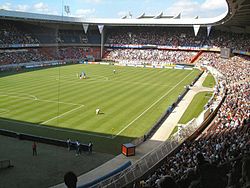| 1972 World Cup | |
|---|---|
| Number of teams | 4 |
| Host country | |
| Winner | |
| Matches played | 7 |
| Attendance | 62,456 (8,922 per match) |
| Points scored | 240 (34.29 per match) |
| Top scorer | |
| Top try scorer | |
The sixth Rugby League World Cup was held in France in October and November 1972. Australia were the holders, while New Zealand had beaten all three of the other nations in 1971 and France were on their home soil. Great Britain won the title and levelled the score of World titles with the Australians at 3-3.
Contents
- Squads
- Venues
- Final Venue
- Results
- Group stage
- Final
- Try scorers
- Tour games
- References
- External links
The final was held at Stade Gerland in Lyon. Great Britain played Australia and, with scores level and unchanged after extra time, claimed the cup on league placing.
This was the last World Cup to be played under the four-tackle rule.






